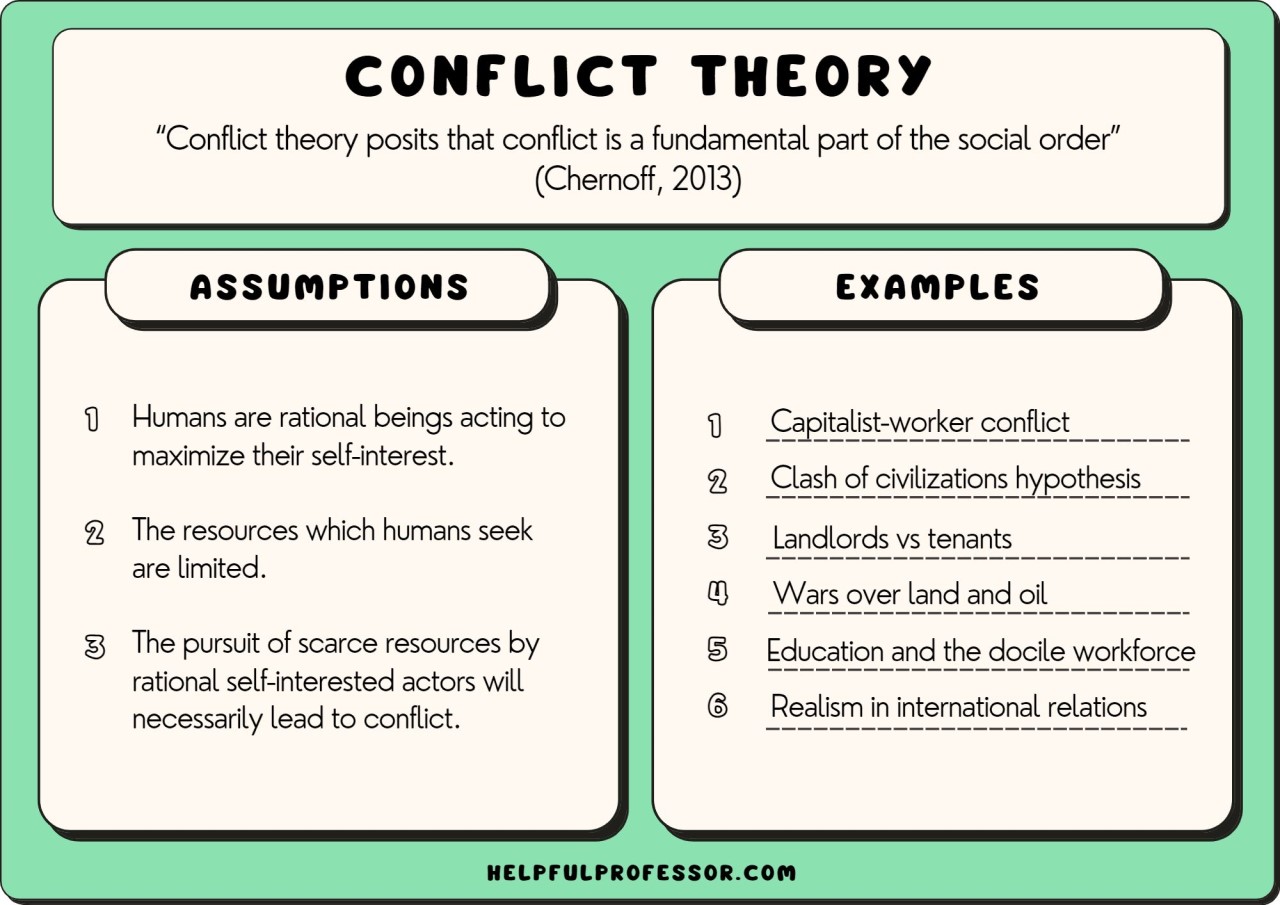Imagine walking into your own home and feeling like a guest, a stranger in a place where power dynamics are constantly shifting, not based on love or mutual respect, but on a system that divides and conquers. This, in essence, is the core of Karl Marx’s conflict theory when applied to the family. It’s not a comforting thought, but it forces us to confront the uncomfortable truths about the structures that shape our most intimate relationships.

Image: helpfulprofessor.com
Marx, the revolutionary thinker, saw the family not as a bastion of love and harmony but as a microcosm of the larger capitalist society, replete with power imbalances and inequality. This article delves into his complex theory, exploring its implications for understanding family dynamics and the struggles we face within them.
The Family as a Site of Class Struggle
At the heart of Marx’s critique lies the concept of “class struggle.” He argued that society is divided into two opposing classes: the bourgeoisie (the wealthy owning class) and the proletariat (the working class). He extended this framework to the family, seeing it as a site where the interests of these classes clash.
For Marx, the family functioned as:
- A Unit of Production: In pre-industrial societies, the family was a unit of production, with all members contributing to its economic well-being. Parents and children alike worked together, forging a sense of shared purpose and collective effort.
- A Unit of Consumption: With the rise of capitalism and the separation of work and home, the family transitioned into a unit of consumption. Capitalist production demanded a workforce that was cheap and easily exploitable; families became the primary means of reproducing this workforce by providing sustenance and raising the next generation of laborers.
This shift, according to Marx, was crucial because it inherently created a conflict between the interests of the capitalist class and the working class within the family unit.
The Patriarchal Family: A Tool of Capitalist Power
In the era of capitalism, Marx believed the traditional patriarchal family became an instrument of capitalist power, reinforcing the existing class structure. The male head of the household, as the primary wage earner, held significant power over his wife and children, who were often relegated to domestic duties. This power dynamic, Marx argued, mirrored the broader power dynamics of capitalist production, where the capitalist class controls the means of production and exploits the labor of the working class.
Here’s how it translates to the family:
- The Male Breadwinner: The male head of the household, often seen as the sole provider, assumed control over the family’s finances and could dictate how resources were allocated. This economic dependency placed women and children in a subordinate position, making them reliant on the male head for their survival.
- The Domestic Sphere: Women were largely relegated to the domestic sphere, responsible for housework, childcare, and managing the home. This unpaid and often undervalued labor supported the capitalist system by ensuring the constant reproduction of a cheap labor force.
- Reproduction of Inequality: By perpetuating these traditional gender roles, the family served as a primary means of reproducing the class system. Children, raised within these structures, inherited not only their parents’ economic standing but also the ingrained values and expectations that justified the existing power imbalances.
The Conflict Theory and Family Dynamics
Marx’s conflict theory highlights the inherent tensions and conflicts that can exist within families. These tensions stem from:
- Unequal Distribution of Resources: Resources like money, time, and emotional support are not always distributed equally within a family. This can lead to resentment, competition, and conflict between different members.
- Differing Needs and Goals: Family members often have conflicting needs and goals. For example, a parent’s need for personal time may clash with a child’s need for attention.
- Power Struggles: Competition for power and control can create conflict within a family. This can be especially pronounced in households where traditional gender roles are still prevalent.
These conflicts are not always overt and dramatic; they can manifest in subtle ways. For example, a parent might make decisions that seem like they are in the best interest of the family but ultimately benefit one child more than another. Or, a spouse might constantly feel ignored and unheard, despite the seemingly harmonious surface of their relationship.

Image: www.semanticscholar.org
Moving Beyond the Conflict: Towards a More Equitable Future
Marx’s theory raises critical questions about the role of the family in society and its potential for perpetuating inequality. While his critique, at times, appears bleak, it offers a framework for analyzing the dynamics of power within our own families and imagining a more equitable future.
Here’s how we can apply Marx’s insights, not to destroy the family unit, but to empower it:
- Challenge Traditional Gender Roles: Recognizing the historical and cultural origins of traditional gender roles opens the door to challenging them and creating more equitable divisions of labor, responsibilities, and resources within the family.
- Foster Open Communication: Openly addressing the needs, desires, and frustrations of all family members can help to create a more understanding and supportive environment.
- Encourage Economic Independence: Promoting economic independence for all family members, particularly women, can diminish the dependence that can lead to power imbalances and conflict.
Karl Marx Conflict Theory On Family
Conclusion: A Legacy of Critical Thinking
Karl Marx’s conflict theory might feel uncomfortable at first, but it serves as a stark reminder that our most intimate relationships are not insulated from the broader societal structures that shape our lives. By applying his insights, we can begin to understand the power dynamics at play within our own families and work towards creating a more equitable and fulfilling life, not just for ourselves, but for future generations. His legacy is not just about tearing down the family structure; it is about using his lens to dismantle the systems that perpetuate injustice and rebuild a family unit grounded in love, respect, and shared power.






